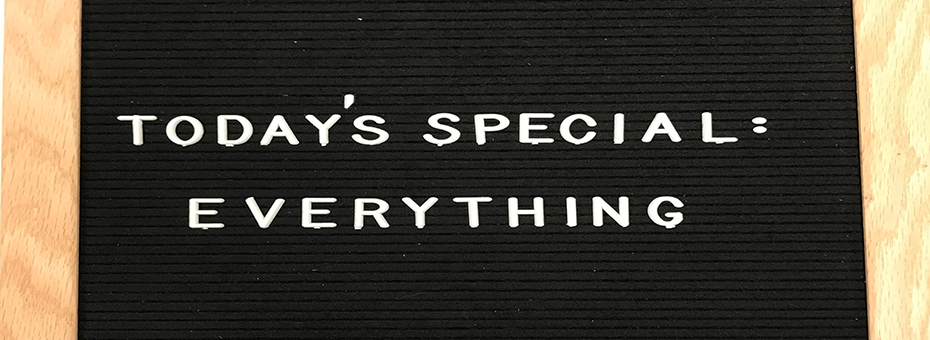Becoming capable of making every product every day goes to the philosophy of why you are converting to lean in the first place. You are trying to deliver more value to your customers than your competitors so that you can gain market share, grow and be more profitable. To do this you need to configure your capabilities to your customer’s needs rather than your own lead time.
This concept is very hard for most people to reconcile with their current practices. If, for example, you are a typical batch manufacturer with a six-week lead-time and build everything based on a forecast using an MRP system (like most traditional companies), you will probably have all kinds of reasons why this is simply impossible. For example, if it takes you two hours to change over a machine, then the number of different products you can make in an eight-hour shift is four—and that doesn’t even allow any run time so the real answer is probably only three different products per eight-hour shift. Next you’ll tell me about all the inventory you would need to carry in order to even think about achieving this objective. Then of course you would raise the issue of why would you even want to do this: things seem perfectly fine the way they are. You are growing, and profitable, so why make such a radical change? After all, isn’t lean just a cost reduction program? Won’t my costs come down if I can make bigger/longer runs?
I certainly understand the argument that the math simply doesn’t work. In fact, even after you get really good at lean the straight math still won’t work, especially if you have a lot of products. At Wiremold we had more than 30,000 products so we never could make all of them in a day even if setup time was zero. But that’s not the point here.
Speed is a potent competitive weapon and the closer you get to being capable of making every product every day the faster your response will be. The closer you get to being able to make every product every day the more value can deliver to your customers. This goal should be what drives everything in lean and that is why it should be one of your key objectives starting out.
Of course you can’t make this just happen overnight; it will take time. You are going to have to change everything that you do just to have a shot at being able to make every product every day. And even if you don’t reach this goal right away, having it as a constant guiding principle will help everyone keep focused on the target. After all, lean isn’t just a bunch of tools or a cost reduction program. It is a strategic approach to running your business that helps to answer the fundamental question of “what are we trying to do here?” The answer is that we are trying to deliver more value to the customer. Building in flexibility and responsiveness boosts our ability to do so.
Now the good news is that you never will actually have to make every product on any given day. Your customers simply Speed is a potent competitive weapon and the closer you get to being capable of making every product every day the faster your response will be. don’t order that way. The objective is to be capable of responding to the orders that do come in today within your capacity. The “within your capacity” is an important caveat here. Even if you only make one product you can only make up to your capacity in one day. If you get an order equal to three days of capacity, well, in the short term there is not much you can do no matter how good you are, it is going to take you three days and you will have a little backlog.
So what has to change to move towards this objective? Well, let’s start with the most obvious: setup reduction. Most people take their setup times as a given, assuming there’s “not much we can do about that.” If you do that don’t even try to become lean as you have already defeated yourself. At my old company Wiremold, we reduced a rolling mill setup time from 14 hours to 6 minutes, a 150 ton, coil fed punch press with a large progressive die from 3 hours and 10 minutes to 1 minute; and injection molding presses from 2 to 2.5 hours to 1-2 minutes. Machines that used to change over 3 times per week were changing over 20-30 times per day. So you’ll have a hard time convincing me that your setup times are a given.
At Wiremold our setup reduction goals took us pretty far down the path. Before long we had to get our raw material vendors on board, as you can’t be capable of making every product every day unless you have raw material delivered when you need it. Having the “every product every day” objective made it very clear what we needed from our vendors—daily deliveries. Of course they were all batch guys too so when we demanded this they all said no. Laughed at us in fact might be more accurate. But this was a core objective if we were going to become lean so we didn’t give up. We kept going back again and again and gradually we were successful.
We started with our local cardboard box suppliers. There were three of them. We finally got one to agree to try this new approach in return for all the business of the other two guys. We had to run kaizens at his plant to help him reduce setup time, to attach kanban cards to each bundle and to deliver it in the way we wanted. Pretty soon the two former box guys were back saying they could now do daily deliveries (they didn’t think we were serious they said). The first guy kept the business. Now the box guys were all local so it is easier to envision daily deliveries; but our biggest vendors, the steel guys, were not. Even so we did a similar vendor consolidation with a steel vendor in Baltimore, MD (we were in Hartford, CT) where we were getting 6-8 truckloads of steel per day and were able to reduce our steel inventory from 4 months worth to 1-2 days. I think you get the idea. Step by step, never give up.
So, “every product every day” was a major driver for us. It kept everyone on track and allowed us to deliver far more value Lean is a strategic approach to running your business that helps to answer the fundamental question of “what are we trying to do here?” Building in flexibility and responsiveness boosts our ability to do deliver more value to the customer. to our electrical distributor partners. In fact, as we got better we went to them and asked “why are you carrying 4 months worth of our product when we deliver to you at least once per week?” We helped them cut this down to about 3 weeks, thus putting cash back in their pockets. That was the thrust, deliver more value. But “every product every day” delivered many nice side benefits to us. The reduction in inventory freed up a lot of cash and floor space. We could reinvest this in new products and acquisitions (21 of them) to help us grow. We more than quadrupled the size of the business in about 9 years. The setup reductions and flow lines we created delivered huge boosts in productivity. Operating income increased over 13x and enterprise value increased by just under 2,500%. Not bad for side benefits. But these only happened because of our drive to deliver more value by being able to “make every product every day.”
So, don’t get hung up in the math of why this will never work. If you stay the way you are you’ll never see why the “new math” is far superior. Use “every product every day” as a key objective and guiding principle and you will be amazed at what can happen. Just do it.





